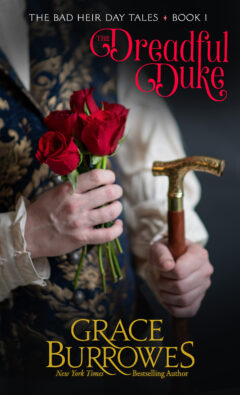The Mysterious Marquess
Book 2 in the Bad Heir Day Tales series
He disappeared years ago. Now he’s back, more mysterious than ever…
The Prodigal Peer…
Lucien, Marquess of Lynnfield, disappeared from the family seat nearly a decade ago, and now he’s back, ready to take his inheritance in hand. Questions swirl–Where was he? Why return now? What sort of man has he become?–and Lucien can’t offer much in the way of explanations. All he knows is, the dearest companion of his youth, Lady Penelope Richard, is being courted by a handsome cad, and Lucien cannot allow her ladyship to waste her future on a scoundrel.
Or the Return of the Rogue?
Penelope hasn’t seen Lucien for years, but she’s been too angry with him for abandoning her to forget him. He broke her heart when he left the first time, and she is quite, entirely, completely over him–almost–until old passion stir backs to life, hotter and more dangerous than ever. If Lucien and Penelope are to share their hearts as well as searing kisses, they will have to overcome their worst fears and outwit an enemy who will do anything to keep them apart.
Enjoy An Excerpt







Chapter One
Lucien Pritchard’s favorite chess piece was the rook, formerly referred to as the chariot or the marquess. The rook began the game in the corner, the whole battlefield open to his view, and his value was higher even than the queen’s.
St. Didier, seated across the board, was in danger of losing his queen’s rook, and to a lowly pawn. To other members gathered in the club’s quiet opulence, the match was of no moment. A pair of gentlemen whiling away a damp spring evening.
Pritchard knew better. “You are distracted,” he said, when St. Didier fiddled with his bishop rather than make the obvious defensive move.
“You are too polite to suggest I forfeit, and you are right.” St. Didier tipped over his king. “I am distracted. I saw the ring.”
“I beg your pardon?” Pritchard’s question was casual, but those four words—I saw the ring—filled him with frustration. He returned his army to its opening formation, taking care to move the pieces in rank order and without haste.
“The lion rampant.” St. Didier allowed his defeated forces to languish on their squares.
“The lion of England. The ring is a sentimental affectation, St. Didier. When one leaves Albion’s shores, little reminders of home take on comforting significance.”
“And my lord left those shores nearly ten years ago. What brought you back?”
My lord. Plagues and afflictions. “A sailing ship brought me back and another might soon carry me away again.”
“My lord excels at the tactical retreat.” St. Didier extended a hand across the chess board, the polite gesture signaling defeat.
Pritchard shook when he’d rather have upended the board. “The lion rampant is probably the most common device in British heraldry.” He set about restoring proper order to St. Didier’s vanquished forces.
“But your lion rampant is in the attitude sinister rather than the traditional dexter, and that caught my eye.”
Pritchard had worn the ring once in recent months, to a gathering hosted by the Dowager Duchess of Huntfield and attended by her nephew—who happened to be the present duke and Pritchard’s employer—and that fellow’s new bride. St. Didier had been in attendance as well, damn the luck.
“Say what you have to say, St. Didier. Whether a decorative creature faces left or right is hardly of any moment. You did not invite me to this table for the sake of a passing diversion.” Though to be fair, St. Didier played well, albeit conservatively.
“You were a decorative creature once,” he replied. “A marquess’s heir. One wonders what turned you up so difficult and contrary.”
“I am contrary by nature.” Pritchard wasn’t yet thirty, but he abruptly felt as weary as a spavined coach horse. “What does great-auntie want now?”
“She wants you home, where you belong, managing the family’s affairs. I am not here on her behalf.”
Of all the cousins, in-laws, step-relations, and impersonators thereof at Lynnfield, only one interested Pritchard significantly.
“Who put you on my trail?” Pritchard braced himself for disappointment, and yet hope stirred as well. St. Didier discreetly located missing, distant, and otherwise obscure heirs for titled families in want of same. He knew the arcana of inheritance, legitimacy, and royal patents, and he’d recently rescued the Huntleigh dukedom from the near occasion of escheat.
He knew society’s scandals and was himself the scion of a house relieved of its honors for want of a proper heir.
“Lady Penelope asked me to locate you,” St. Didier said, picking up the black queen. “She sends her regards.”
What the rubbishing hell did that mean? “Please convey my greetings to her in return.”
Pritchard waited for whatever came next. A request for funds, word of some elder’s failing health, a warning that auntie was growing dotty. Pen would be that decent, he hoped. He would be decent enough to respond civilly too.
“Her ladyship is troubled by a legal matter,” St. Didier said. “You can solve it for her.”
Once upon a time, Pritchard would have surrendered his life for Lady Penelope’s pleasure. “St. Didier, you try my patience. The hour grows late for a mere major duomo. My solicitors have always known how to reach me.”
“Her ladyship dislikes confiding in what she refers to as a boogle of longwinded weasels.”
Her ladyship was apparently still outspoken. Good for her, though she was also approaching spinsterhood, when such eccentricities were not as generously tolerated.
“She sometimes called them a sneak of weasels,” Pritchard said, and immediately regretted it. “Both terms are correct.”
St. Didier wasn’t given to smiling, but his dark eyes gleamed with amusement. “The solicitors drafted your betrothal agreements, and you and the lady signed them.”
“We were told to sign them.” Ordered to sign them. “Both of us were yet in our minorities, so the agreement was never binding on us.” Pritchard had consulted independent counsel to confirm that fact before leaving England.
“Just so. You were both underage, and now you have both attained your majorities.”
A cold, sad feeling took up residence in the center of Pritchard’s chest. “Her ladyship is free to do as she pleases.” She always had been, did she but know it.
“You will execute a formal repudiation of the betrothal agreement?”
“Of course.” The pain in Pritchard’s chest congealed into sorrow, but cutting the last tie to the past was doubtless for the best.
“Her ladyship thanks you.”
Years overdue. “She has nothing to thank me for. Send me the relevant documents and I will append my signature before witnesses.”
“As it happens, I have the papers with me now.”
The tried and true tactical retreat beckoned. Pritchard had known this day would come, but he hadn’t known it would come under the guise of a friendly game of chess at a quiet club for gentlemen of slightly awkward standing. Younger sons, former MPs, gentlemen whose fathers had been in trade… The Marches was a place for those whom society tolerated rather than accepted.
Signing a repudiation would be one more step away from the center of society, a step Pritchard should have been eager to take.
“If you intend to witness my signature,” he said, “we still need a second and third witness to appease the formalities. I cannot allow my ancient history to become common knowledge here.” A delaying tactic, also a valid concern. These men knew Pritchard as the general factotum of the new Duke of Huntleigh, not as a marquess’s heir who’d disappeared from society years ago.
St. Didier paused, withdrawing an empty hand from the breast of his evening coat. “My apologies. Discretion is warranted for the lady’s sake if not for yours. You are right again.”
“Come around tomorrow.” Pritchard said. “The ducal abode is quiet now that Their Graces have taken ship. I am to have tea with the dowager tomorrow, but I should be able to attend you any time before noon.”
Before polite society was out and about, enjoying the increasingly temperate weather, and the increasing stores of gossip to be gathered over in the shops and on the bridle paths.
“Tomorrow then. You are being unexpectedly reasonable.”
Pen had expected a fight? “I wish her ladyship every happiness. You may tell her as much. Another game would suit.”
Except the game did not suit. Too many games played with Penelope—chess, backgammon, and even kissing games—crowded onto the field of memory. Pritchard won. He usually won.
Not all the time, though. Pen had been a fiend for the sneak attack. A queen in her hands was the equal of any rook. Did she still play? If she didn’t, that would be a shame, but against whom could she aim all that skill and guile?
“Twice defeated,” St. Didier said, some thirty minutes later. “I must give some thought to my strategies. Shall we enjoy the night air while the rain has let up?”
God, yes. Solitude beckoned. Solitude and the decanters. “You didn’t bring your coach?”
“I like to walk. I’m not the inveterate perambulator that Huntleigh is, but neither am I sedentary by nature.”
St. Didier was given to prowling, stalking, and noticing, all while pretending to be just another quiet, dark-haired gent blessed with skilled tailors and some means.
When they reached the street, mist diffused the lamplight, and the hour—neither late nor early—meant no wheeled traffic rattled along on the cobbles. A good night for sorrowing.
“How is she?” Pritchard asked, when he and St. Didier were two streets away from the club and the street lamps were farther apart.
“Lady Penelope? She’s… robust, astute, formidable.”
Pen was also pretty, but nobody noticed that in the face of her intellect and personality. “Does she laugh?” A younger Pritchard had delighted in provoking her laughter.
“I cannot say. Our dealings have been largely by letter. When I did meet with her, she appeared to be thriving. Very certain of her objectives.”
Too certain, sometimes. Stubborn, heedless… all the shortcomings she’d ascribed so credibly to Pritchard, though it had taken him years to notice that pattern.
“Give her my regards. I’m around the corner here. Goodnight, St. Didier. Your discretion is appreciated.”
“Spoken like a peer, if you don’t mind my saying so. Are your sure you don’t want to make a short visit to Lynnfield to discuss the situation with her ladyship?”
“I know my own mind, sir.” And knew better than to clap eyes on Penelope at any distance less than twenty yards. “Good night, St. Didier.”
“Until tomorrow.”
They bowed and parted, but a question occurred to Pritchard, one he could ask no other. He retraced his steps lest he shout his query into the London darkness.
“I assume Lady Penelope is tending these legalities at long last because she has marriage in mind,” he observed, trying for nonchalance. “Who is the lucky fellow?”
“Hmm? Oh, the lucky fellow. Well, they aren’t engaged of course, given the unrepudiated agreement, but her ladyship has been saving her waltzes lately for Sir Dashiel Ingraham. Not a love match, one notes, but very cordial.”
Pritchard was grateful for the darkness. “I see.” He saw Penelope smiling up into the face of an Adonis who would never be worthy of her, and in fact wasn’t worthy of a baronet’s honors, either. “Sir Dashiel.”
“He’s home from the wars, considered quite the catch, and they do seem to get on.”
Sir Dashiel excelled at getting on. Always had.
St. Didier arranged a claret-colored scarf about his neck. “Shall we say ten of the clock tomorrow?”
That scarf—a red flag against otherwise subdued attire—caught Pritchard’s eye. Penelope was forthright to a fault, not given to subterfuge, much less subtlety. Pritchard had loved that about her.
Appreciated that about her, rather, and yet, Pritchard had a chess master’s imagination. He considered it just possible that Pen had got herself in to a situation involving Sir Dashiel that wasn’t quite what it appeared to be.
Or perhaps it was exactly what it appeared to be: An impending courtship between two adults, who would make a fine, cordial match.
But Sir Dashiel Ingraham… Pritchard’s soul rebelled at the very thought. Years ago, Penelope had been unwilling to trust to the good intentions of a young man she’d considered her best friend. What did Sir Dashiel have to offer that Pritchard lacked?
“You can send the documents over,” he said, “but don’t bother coming around. I’ll be looking in on Lynnfield after all. The legalities can wait a few days.”
St. Didier offered a slight bow. “Very good, my lord. I am at your service if you’d like a traveling companion.”
He walked off into the night.
“Don’t milord me,” Pritchard muttered, as St. Didier’s footsteps faded.
Pritchard turned the opposite direction and considered the decision he’d just made. He’d hear nothing but milording at Lynnfield, that and auntie’s lectures and importuning. If he could hear Penelope’s laughter, though…
Well, no. Best all around not to hear Penelope’s laughter. All that was in the past.
The rain resumed, and Pritchard marched for the empty house he’d lately been calling home.
End of Excerpt
This book will begin shipping in Summer 2024
The Mysterious Marquess is available in the following formats:

Grace Burrowes Publishing
August 23, 2024
- Grace’s BookstoreThis is Grace’s
independent
ebook store.
Your purchase can be added to any device. - Barnes & Noble Nook
- Kobo
- Apple Books
- Amazon Kindle
eBook:
Other eBook Purchase Options:
Print:
Print order links coming soon!
- Kobo UK
- Amazon Kindle UK
United Kingdom:
Connected Books
The Mysterious Marquess is Book 2 in the Bad Heir Day Tales series. The full series reading order is as follows:
- Book 1: The Dreadful Duke
- Book 2: The Mysterious Marquess














